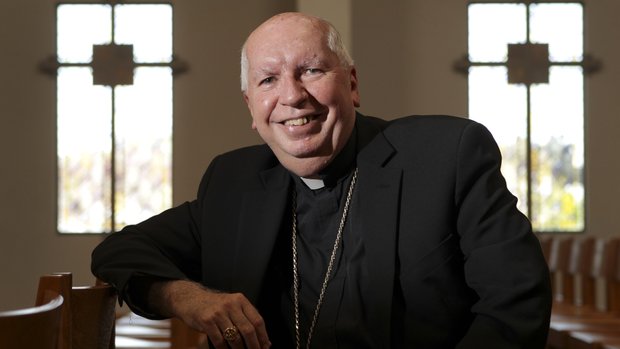Bishop Flores RIP
As those of you who live in San Diego will doubtless know by now, a few days ago, Bishop Flores passed away. A few months ago he suffered a stroke and we heard recently that his condition had seriously deteriorated.

I was a member of the Diocesan Pastoral Council around the time Bishop Flores took over the care of San Diego Diocese from Bishop Brom. Through these Council meetings, as well as through various diocesan events, I got to know this shepherd of Christ reasonably well. He was kind and had a great sense of joy, as well as certainly having some fire in his bones! He was extremely supportive of the Young Adult Catholic Community here in San Diego.
At 7:30pm the Young Adult Community in San Diego will be praying a rosary for Bishop Flores. Please join us in prayer, even if you can’t make it to the church.
My favourite memory of the Bishop was at the Rite of Election this year. My roommate Nathan was entering the Church and I was (for my sins) his sponsor. As we stood with the other candidates and catechumens having a group photograph, Nathan whispered to me “I want to high five the bishop”. As Nathan is always a bad influence on me, I whispered back “Do it!”. Nathan quickly made his way down to the bishop. Oh, it was the highest of fives… 🙂
Now that Bishop Flores has gone to be with the Lord, I can’t help but think of the words of St. Ignatius of Antioch to the young Bishop Polycarp at the beginning of the Second Century:
The times call for you, as pilots do for the winds, and as one tossed with tempest seeks
for the haven, so that both you and those under your care may attain to God. Be sober
as God’s athlete: the prize set before you is immortality and eternal life
– St. Ignatius of Antioch to St. Polycarp
You have run your race, Bishop Flores. May you rest in peace.
 I recently had a conversation in which a friend said that he was quite liked relativism. Relativism has all kinds of problems, not least of which is that there exists a logical contradiction at the most basic level, since it makes an absolute statement in saying that everything is relative.
I recently had a conversation in which a friend said that he was quite liked relativism. Relativism has all kinds of problems, not least of which is that there exists a logical contradiction at the most basic level, since it makes an absolute statement in saying that everything is relative. Last week we had some Taizé chant, so I thought this week we’d have a Byzantine chant, “O Virgin Pure”:
Last week we had some Taizé chant, so I thought this week we’d have a Byzantine chant, “O Virgin Pure”: Theology On Tap was running last month and one of the speakers in this series was
Theology On Tap was running last month and one of the speakers in this series was 

 If you’ve been around in Christian circles, you’ll almost have certainly come across the abbreviation WWJD, which stands for “What Would Jesus Do?”. In a previous post I addressed
If you’ve been around in Christian circles, you’ll almost have certainly come across the abbreviation WWJD, which stands for “What Would Jesus Do?”. In a previous post I addressed 